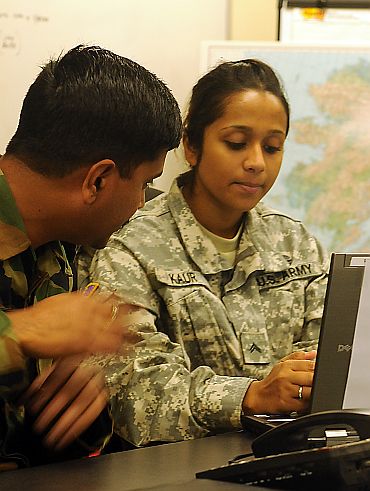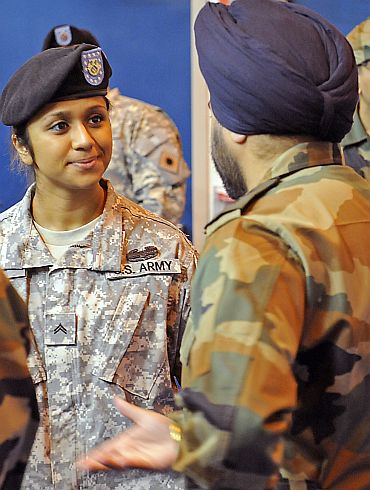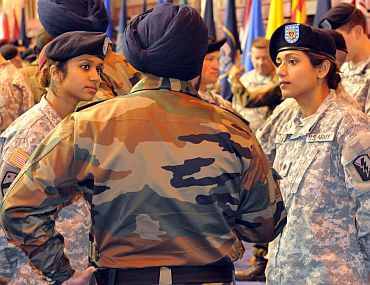Photographs: Spc Ashley M Armstrong/US Army Photo United States Army Alaska
Military operations between India and United States can be challenging with the diversity of language, cultures and traditions.
US Army Alaska found an untraditional method of alleviating those challenges when they discovered India-born sisters Corporal Balreet Kaur and Specialist Jasleen Kaur -- both medics for the 79th Infantry Brigade Combat Team (National Guard) who are now serving as cultural liaisons between the armies of the two nations during exercise Yudh Abhyas 2010.
The 14-day exercise started November 1 at Joint Base Elmendorf-Richardson, and serves as an opportunity to strengthen military cooperation between the two countries.
"This brings our two countries much closer together and anytime we have experts from the other country it brings us much further along. They understand their customs and courtesies, so they help us out tremendously and make sure that we do not violate any of the normal policies that they follow," said US Army Alaska Deputy Commander Col Mark S Lowe, acting exercise director.
The Indian-born sisters were specifically chosen for the exercise because of their background, knowledge and experience -- providing a common ground between the two armies. The soldiers also serve as medics and are involved in role-playing.
...
'When we speak to them in Hindi they feel a little closer to home'
Image: Balreet Kaur discusses her heritage with an Indian Army soldier before the opening ceremony for the combined training exercise Yudh Abhyas 2010Photographs: Spc Ashley M Armstrong/US Army Photo
They also speak Hindi, which helps with communication during the training events.
"When we speak to them in Hindi they feel a little closer to home. Their faces light up to know that we can speak their language and that one barrier is down," said Jasleen.
Jasleen and Balreet have provided guidance to USARAK on different accommodations that were necessary for the Indian soldiers to feel more comfortable in an unfamiliar environment.
"In India, we shower with buckets that we fill with tap water and we use a mug to scoop the water out, so they wanted to make sure that the Indian soldiers in the field had the right mugs," said Balreet.
"They really have given 110 per cent here. They have even offered Indian meals at the chow hall," added Jasleen.
Initially, they were nervous about how the Indian Army would respond to them and were surprised with the attention they received.
'We actually got to learn more about where we came from'
Image: Balreet Kaur and Jasleen Kaur compare common courtesies of India and the US with an Indian Army soldierPhotographs: Spc Ashley M Armstrong/US Army Photo
The sisters and their family left India in 2001 because of religious conflict in their home village and they haven't returned since, so the experience during the exercise has been refreshing and educational for them, they said.
"With this experience, we actually get to learn more about where we came from and we get to learn about the Indian military. It's been discussed many times how key this exercise is with the Indian army and the US Army, so for us to be a part of that and to be exposed to this sort of setting is beneficial to us and, of course, to both parties," said Balreet.
They have already learned many differences with rank structure, equipment and combat operations from conversations with the Indian soldiers, said Jasleen.
"Everyone knows those two young soldiers and they've been very helpful at the senior-officer level, the NCO-level and the soldier-level, so they have established great rapport with the Indian Army. If anything, it will bring our countries much closer," said Lowe.




article